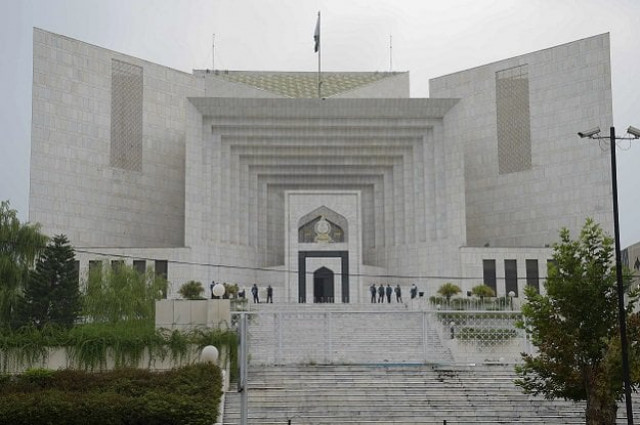SC wants qualified staff at narcotics labs
Top court says efficient, credible and proficient labs are integral

Supreme Court of Pakistan. PHOTO: AFP
“Efficient, credible and proficient narcotics testing labs are integral for successful execution of the act and the rules. The said labs have to be manned by competent analysts having prescribed qualifications.
“Rule 3 provides for the qualifications of a government analyst and it has already been held to be a mandatory provision by this court,” said a 14-page order of the Supreme Court issued with regard to a case involving the state’s petitions seeking enhancement of sentence in narcotics crimes.
The order, passed by a bench comprising Justice Syed Mansoor Ali Shah, Justice Asif Saeed Khosa and Justice Maqbool Baqar and authored by Justice Shah, said the obligations of the government analysts under these rules must be complied with for ensuring accurate and meaningful chemical analysis.
“Officials of the national and provincial narcotics testing laboratories shall follow the rules in the best manner possible so that efficient and meaningful chemical analysis can be achieved. In case of failure, disciplinary action be taken against the officials, in accordance with law,” it added.
SC wants CCI decision on Kalabagh dam honoured
The order said in order to standardise the narcotics testing laboratories, the protocols and tests applied by these laboratories must meet common international standards – the guidelines issued by the United Nations Office on Drugs and Crime (UNODC) or Scientific Working Group for the Analysis of Seized Drugs (SWGDRUG) or the International Organization for Standardization (ISO) – 17025:2017.
It said rule 6 of Control of Narcotic Substances (Government Analysts) Rules, 2001 stands on a different statutory footing as it provides that the report of the government analyst, after the test and analysis, is to furnish the result together with full protocols of the test applied.
“The accuracy of test and analysis and the correct application of the full protocols alone can determine if the recovered substance is a narcotic drug or a psychotropic or controlled substance.
“‘Protocol’ means an explicit, detailed plan of an experiment, procedure or test or a precise step-by-step description of a test, including the listing of all necessary reagents and all criteria and procedures for the evaluation of the test data,” it added.
The order said the Narcotic Substances (Government Analysts) Rules, 2001 substantively provides for prohibition of cultivation of narcotic plants and prohibition of possession of narcotic drugs.
“Punishments for contravention are provided under section 9 which range from imprisonment, extending to two years and moving up to capital punishment of death or imprisonment for life depending on the quantity of the narcotic drug, psychotropic or controlled substance,” it added.
The court said the chain of custody is pivotal, as the entire construct of the act and the rules rests on the report of the government analyst, which in turn rests on the process of sampling, and its safe and secure custody and transmission to the laboratory.
Shehbaz wants to combat crime through technology
“The prosecution must establish that the chain of custody was unbroken, unsuspicious, indubitable, safe and secure. Any break in the chain of custody or lapse in the control of possession of the sample, will cast doubts on the safe custody and safe transmission of the sample(s) and will impair and vitiate the conclusiveness and reliability of the report of the government analyst,” it said.
Rule 6 requires that full protocols of the test applied be part of the report of the government analyst. Every test has its protocols, which are internationally recognised and a test without the observance of its protocols has no sanctity. Hence, the report under Rule 6 must specify every test applied for the determination of the seized substances with the full protocols adopted to conduct such tests, it added.

1724319076-0/Untitled-design-(5)1724319076-0-208x130.webp)

















COMMENTS
Comments are moderated and generally will be posted if they are on-topic and not abusive.
For more information, please see our Comments FAQ